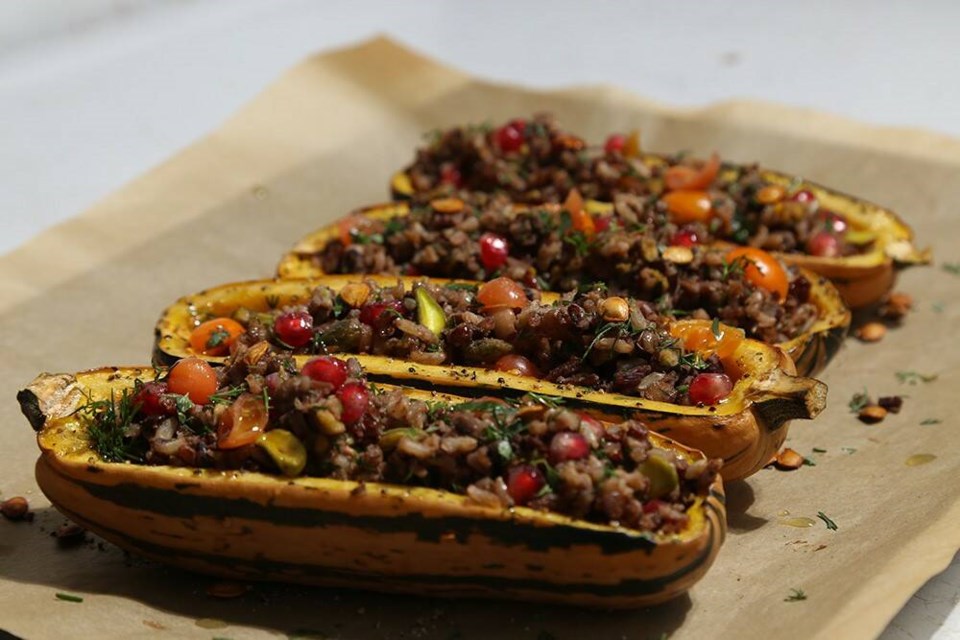It is hard to imagine a more perfect food plant than beautiful delicata squash. If we had to pack up and evacuate, our delicata seeds would come with.
Named for their delicate and edible skin, delicata are as delicious as they are nutritious, most particularly the Honey Boat variety, one of the sweetest squash varieties in existence.
One might think that, with a name like delicata, these vegetables (fruits, technically) would be fuss budgets to grow. Not so. Delicata are categorized as summer squash, along with softies like Romanesco, but they store very well if clean and unblemished, so in my books they are winter keepers.
Delicata plants are seemingly intelligent, and certainly resilient. The large and beautiful leaves repel insects naturally with microscopic urticating fibres, and they self-shade the soil and root zone beautifully. Delicata can be grown in a bed with most other vegetables, without any additional watering, and they require very little maintenance.
Inevitably, some time after generous fruit set, we see some variation of powdery mildew on the leaves, which, contrary to imagining, crisps the leaves in a manner akin to freeze drying. I snip and bury the affected leaves in a remote corner of the back garden, a practice that opens the vines up to more air and sunshine. I like the way that the ripening squash, laid bare to the elements, look basking in the late summer sun. We trellis our squash, which looks very elegant, but also helps with yield and space management.
Delicata are not considered a particularly nutrient-dense squash, compared to a butternut for example, but they are complex and well-rounded, providing an assortment of beneficial macro and micro nutrients, and an impressive amount of fibre.
Compared to spaghetti squash, which we also grow, delicata contain more protein, vitamins A and C, and provide more (but few) calories and carbohydrates. According to the Nutritionix, super sweet and meaty delicata offer just 76 calories, 0.7 g fat, and 18 g carbs per cup serving, with 5.7 g fibre (23 per cent daily value), 1.8 g protein, 214 per cent DV vitamin A, 33 per cent DV vitamin C, 3.5 per cent DV calcium, 14 per cent DV potassium, and five per cent DV iron.
Based on flavour alone, honey boat delicata wins hands-down over other squash, with a texture and taste very much like sweet potato. I slice honey boat cross-wise, remove the seeds, drizzle with garlic oil and salt, and roast for 20 minutes or so at 175 C. The gorgeous delicata rings can be served skin-on, hot or cold as a vegetable side, enjoyed in a roast vegetable sandwich or salad, or Vitamix-blitzed into a high-fibre soup or pasta sauce base to thin with little more than vegetable stock and/or nut milk.
During this past week of atmospheric rivers, I stuffed roasted honey boats with a mix of wild and brown rice, lentils (red, black, laird), black-eyed beans, split peas, barberries, apple chips, diced cherry tomatoes, pistachio nuts, pomegranate seeds, and fresh dill. I cooked the rice mixture and barberries in organic chicken stock flavoured with sea salt and home-made Thai spice blend, and folded the fresh ingredients in just before serving, ensuring that their brilliant reds, greens and golds shone bright against the gorgeous copper-coloured flesh and skin of the pre-roasted squash.
To pre-roast the boats, cut delicata squash lengthwise with a very sharp knife, then scrape the seeds and their stringy pulp out with a spoon. Rub the exposed flesh with garlic oil, or olive oil and the cut edge of a garlic clove, and season with sea salt and pepper. Roast cut side up in a 175 C oven for 30 minutes or so, until fork tender.
A super easy and très élégant trick is to roast a few clean and garlic oil coated squash seeds alongside the empty boats, and then use the tiny toasted seeds as garnish.
The crazy delicious stuffing mix is beautiful enough for the most discriminating holiday table, but more important, it is nutrient-densely packed with too-many-to-mention beneficial macro and micro nutrients, antioxidants, fibre and so much more
Not-so delicata — the warrior princess of our urban permaculture garden.
Laura Marie Neubert is a West Vancouver-based urban permaculture designer. Follow her on Instagram @upfrontandbeautiful, learn more about permaculture by visiting her Upfront & Beautiful website or email your questions to her here.
For a taste of permaculture, click on the YouTube link below:
(Video - Courtesy of West Vancouver Memorial Library)



